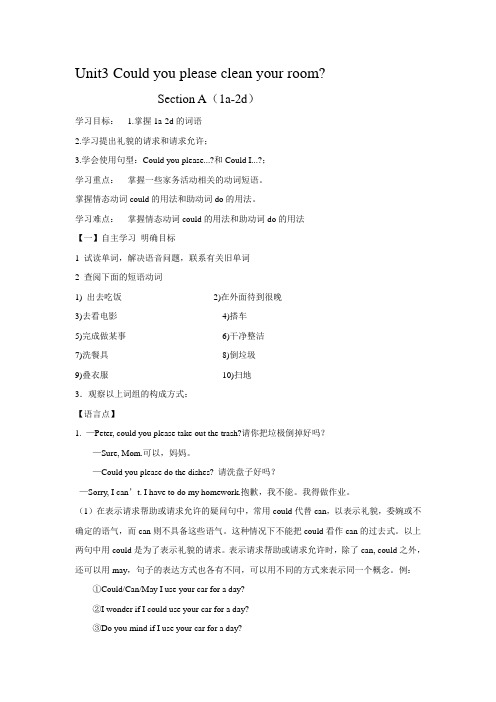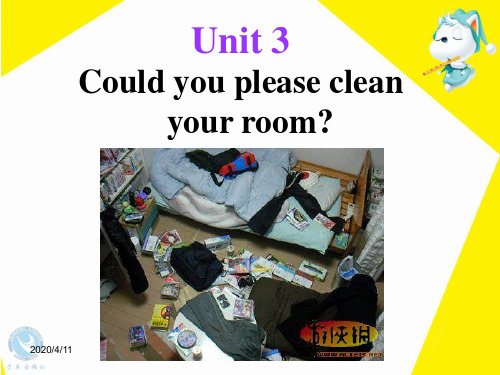unit 3 Could you please clean your room 短语
- 格式:ppt
- 大小:734.50 KB
- 文档页数:29

Unit 3 Could you please clean your room一.单项填空(共15小题;每小题1分,满分15分)从每小题所给的A、B、C、D四个选项中选出一个可以填入空白处的最佳选项。
( )1. —Could you please your room, Tom— .A. cleaning, No problemB. clean, CertainlyC. to clean, Of courseD. clean, No I couldn’t/( )2.—Do you like to_______ your bed—No,I hate to_______ chores.A.do;do B.do;make C.make;do D.make;make( ) you tell me how I_______ get to the No.168 Middle SchoolA.Do;can B.Can;could C.Could;can D.Could;could( )4. Miss White, I’m going out, could you _______ my child for a whileA. look forB. look overC. look atD. look after( ) you like a cup of tea-A. WouldB. DoC. AreD. Could( )6. It is a year of ox. My parents gave _____a nice toy ox on New Year’s Day.A. IB. meC. mineD. my( )7. —Meimei is _____the difficult math problem. —I’m sure she’ll _____.A. working on; work it onB. working out; work it outC. working out; work it onD. working on; work it out( )8. Could you _____the window I feel a little cold.A. please not openB. please not to open:C. not please to closeD. please not to close( )9. Many kids like ________ very much, but they are not good for their health.B. choresC. snacks TV( )10.—Could I use your computer, Dad—Sorry, you _______. I’m going to work on it.A. wouldn’tB. can’tC. needn’tD. don’t have to( )11. ─ _____ do you do the dishes ─ Every day.A. How soonB. How longC. How oftenD. When;( )12. —Could you buy us _________ drinks—Sorry, I don’t have _____ money.A. any; anyB. any; someC. some; someD. some; any( )13. Excuse me, Peter. There’s something wrong with my car. Could IA. go for a driveB. get a rideC. give me a rideD. go for a walk ( )14. There are still a few hamburgers. Would you like to have one, JuliaA. the otherB. otherC. othersD. another( )15. My dad tells me not to ________ too late in the evening. He says it is dangerous.%A. stay outB. grow upC. come outD. get up二.完形填空(共10小题;每小题2分,满分20分)阅读下列短文,从每小题所给的A、B、C、D四个选项中选出一个最佳选项。

Unit 3 Could you please clean your room?一、theme(了解):chores 做家务二、Grammar: permission许可:发出请求和请求允许的句型1、Could you (please)+动词原形+、、、?请你、、、、好吗?发出请求1)肯定回答:Yes, I can. \ Yes, sure.\ No problem.2)否定回答:Sorry, I can’t. I’m afraid I can’t.2、Could I +动词原形+、、、?我可以、、、吗?请求允许1)肯定回答:Yes, you can. Yes, please.2)否定回答:Sorry, you can’t. I’m afraidyou can’t.考点:以could开头的表示礼貌地发出请求或请求允许的疑问句,简略回答不能用could\couldn’t,要用can\can’t.三、知识点P171、考点1)take out the rubbish丢垃圾take out把、、、带出去,取出,动词+副词,代词放中间,take it outrubbish un 垃圾 throw the rubbish扔垃圾2)do the dishes刷盘子 fold your clothes 叠衣服sweep the floor扫地make your bed 整理床铺Clean your living room打扫起居室3)do the chores(cn)=do housework做家务P182、1)stay out late在外面待到很晚2)get a ride 搭便车 3)need to do sth 需要做某事(need实义动词)need do sth(情态动词)4)have to do sth 不得不做某事3、1)help (sb) out with sth帮助(某人)做某事(常指帮助某人摆脱困境)2)at least至少3)finish doing sth做完某事4、1)Two hours of TV isenough for you.短语(名词短语、现在分词短语、不定式短语)作主语,谓语动词用单数。

Unit3 Could you please clean your room?Section A(1a-2d)学习目标: 1.掌握1a-2d的词语2.学习提出礼貌的请求和请求允许;3.学会使用句型:Could you please...?和Could I...?;学习重点:掌握一些家务活动相关的动词短语。
掌握情态动词could的用法和助动词do的用法。
学习难点:掌握情态动词could的用法和助动词do的用法【一】自主学习明确目标1 试读单词,解决语音问题,联系有关旧单词2 查阅下面的短语动词1) 出去吃饭_______________ 2)在外面待到很晚_______________3)去看电影_______________ 4)搭车_______________5)完成做某事_______________ 6)干净整洁_______________7)洗餐具_______________ 8)倒垃圾_______________9)叠衣服_______________ 10)扫地_______________3.观察以上词组的构成方式:【语言点】1. —Peter, could you please take out the trash?请你把垃极倒掉好吗?—Sure, Mom.可以,妈妈。
—Could you please do the dishes? 请洗盘子好吗?—Sorry, I can’t. I have to do my homework.抱歉,我不能。
我得做作业。
(1)在表示请求帮助或请求允许的疑问句中,常用could代替can,以表示礼貌,委婉或不确定的语气,而can则不具备这些语气。
这种情况下不能把could看作can的过去式。
以上两句中用could是为了表示礼貌的请求。
表示请求帮助或请求允许时,除了can, could之外,还可以用may,句子的表达方式也各有不同,可以用不同的方式来表示同一个概念。


八年级英语Unit3 Could you please clean your room课文讲解Unit 3: Could You Please Clean Your Room?n A:1."Peter。
could you please take out the trash?" This is apolite request asking Peter to take out the garbage。
"Could you please do something?" is a polite way to ask for ___ or assistance。
"Could" is a more polite way to ask than "can." The response tothis request can be "Sure," "Of course," "Certainly," or "No problem." If the person cannot do it。
they can say "Sorry。
Ican't." "Take out" means to remove something from a place。
When using a pronoun as the object。
it should be placed in the middle of the phrase。
For example。
"You can take it out."2."Can you do the dishes?" This is asking if the person can wash the dishes。

Unit 3 Could you please clean your room?1.小明放学后非要帮妈妈做家务,妈妈说你不会干,别捣乱,一边玩去,小明还是坚持要帮忙,说是老师给布置的任务,妈妈说:你们老师屁事真多!第二天,小明把帮妈妈做家务整个过程的日记交给了老师。
2.我曾经尝试过做饭,但每次我都会把厨房变成一个烟雾缭绕的战场。
现在,我确信我的厨艺唯一能做的就是制作烟雾报警器。
3. 有一次,我决定自己洗衣服。
不幸的是,我把红袜子和白衬衫放在了一起。
结果,我得到了一件粉色的衬衫和一堆淡红色的袜子。
看来我在洗衣方面的创新精神比我想象的要强。
4. 老婆总是说我不会做家务。
有一天她不在家,我决定展示一下我的能力。
我打扫了整个房子,甚至把家具都重新布置了。
当老婆回到家时,她看着我,然后说:“你确定你是打扫了,而不是把家里翻了个底朝天?”5. 我试图拖地,但每次拖把都会比我先累。
我猜它可能是在抗议我让它做的太多工作。
6. 我尝试做饭,打开食谱应用程序,发现需要10分钟准备,50分钟烹饪。
到现在我已经花了45分钟在决定做什么菜。
7. 我发现了一种新的家务活动——找东西。
我妻子总是让我找她的钥匙、手机或其他东西。
我想我应该把这个加到我的简历上,我现在是一名专业的“失物搜寻者”。
8. 我妻子总是抱怨我不帮忙做家务。
但我认为我在精神支持方面做得很好——我总是鼓励她去看那些家务做得很好的电视节目。
拓展阅读(一)There are certain things you never imagine yourself saying.“I just got a worm in my eye!” is one of them.And yet I did say it—I screamed it, actually.The family was all here and we were in the garden, when I saw a worm nearby. I asked my six-year-old grandson to come over and remove the worm. He picked up the worm, studied it quickly and then threw it into the air.The worm quickly fell back to earth, landing on my face against my left eyelid. That’s when the screaming started and the jumping up and down.You know how they say when you meet a small creature, that the small creature is just as afraid of you as youare of it? They lie.The worm showed no fear. I, however, am still having nightmares about the experience, which was several days ago.The most important thing in all this is that my grandson said he was sorry to me.I’d just been reading a book that makes a connection between adults doing the slow and hard work of teaching manners to children and greater levels of civility in society.Table manners, language manners and even manners in dress all show levels of self-control.Having self-control limits what we say and how we behave, making many of us appear a good deal better than we really are.Good manners also have the possibility to make mealtime a pleasant experience, even with small children.All of my grandchildren, except the ones that can’t yet talk, ask to be excused before leaving the table.It is a sign of respect for others at the table and a sign of respect for the meal itself. It’s also more pleasant than pushing one’s chair back and running for the back yard.Those tall enough, and even those not tall enough, also take their dishes to the kitchen.Manners are what civilize us—around our tables, in our families, homes and our communities.So when a little boy has the courage to apologize to a grandma who is screaming and jumping up and down, at least we know that our years of teaching young people manners are paying off—one worm at a time. 1.Where were they when the author saw a worm?A.In the house.B.In the garden.C.In the park.D.In the back yard.2.The worm fell down on the author’s________.A.leg B.head C.left eyelid D.right eyelid3.What does the underlined word “nightmares” mean?A.好运B.噩梦C.回忆D.愿望4.The author believed that his grandson’s apology is________.A.a good manner B.a bad behavior C.unnecessary D.a must5.What does the passage tell us?A.The importance of apology.B.The importance of good manners.C.Many kinds of good manners.D.A story of a worm.【答案】1.B 2.C 3.B 4.A 5.B【导语】本文主要以作者与其孙子的故事来讲述礼仪的重要性。
Unit3-could-you-please-clean-your-room-知识点及短语Unit3 知识点1. Could you please do sth ?请你(做)......好吗?Could用于提出请求,不是can的过去式,是委婉、礼貌的说法。
回答用can.2. 【短语】take out the trash 倒垃圾take a walk 散步take away 拿走/取走take back 收回take place 发生take off 脱下;起飞3. do the +名词:do the dishes/ laundry 洗餐具/衣服do the +doing: do the cleaning 打扫卫生do one’s + 名词: do one’s housework/ homework 做家务/家庭作业do some +doing: do some reading/ shopping 读写书/购物4. 表示时间、距离、金额、度量等词语作主语时,通常被视作整体,谓语动词用单数形式。
5. enough 修饰名词时,置于名词前/ ;修饰形容词、副词时,后置。
6. the minute = as soon as “一...... 就......”7. in front of指在物体外部的前面in the front of指在物体内部的前面8. come 短语:come over 过来come back 回来come up with想出come true实现come down下来come from=be from来自,出生于come in/into进入,进来come on赶快,加油come along走吧,过来,快点come and go来来去去come up上来come out出来,(花)开,(照片)冲洗出来9. all the time = always 一直;总是time 短语:on time 按时in time 及时at the same time同时the first time 第一次at times 有时last time上次next time 下次10. neither +助动词+主语“某人(主语)也不”neither …nor… 既不…也不…,做主语谓语动词符合就近原则。